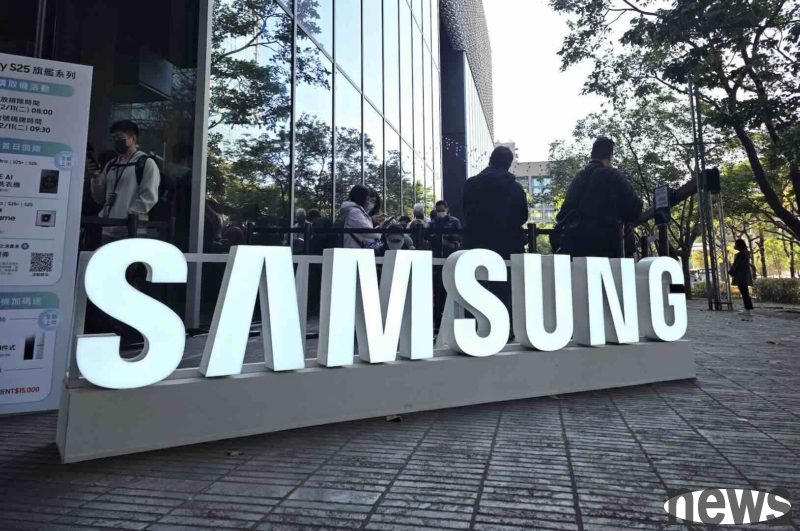Foreign media reported that Samsung's core semiconductor business in South Korea is facing increasingly severe challenges. Under the pressure of NT$ and SK Hynix, Samsung has faced a sharp decline in production, market share loss, supply chain d...

Foreign media reported that Samsung's core semiconductor business in South Korea is facing increasingly severe challenges. Under the pressure of NT$ and SK Hynix, Samsung has faced a sharp decline in production, market share loss, supply chain disruption and market changes. Samsung regards artificial intelligence (AI) as the key to transforming the data, actively promoting the deep integration of AI and devices, with the goal of 90% of devices becoming AI by 2030. And significantly increase R&D funds and consider major mergers to accelerate innovation and restore market position.
Samsung's semiconductor industry was once an important pillar of growth, but recently it has been maintained due to supply chain disruption and the pressure of competitors. According to analysis by market regulation agency TrendForce, Samsung predicts that the competition in the memory market will continue to intensify, and the production of NAND flash memory production facilities in Xi'an has been reduced, which further highlights the deep-seated dilemma.
Earlier this year, Korean media Chosun Daily reported that Samsung's large-scale market share declined for the first time in a decade, especially due to the yield problem of the crystalline foundry, which severely weakened its ability to compete with Taiwan Electric, the leader in the industry. In the face of doubts about not being able to make full use of the AI craze, Samsung's high-level public commitments were made to purchase on a large scale to fill in technology and market gaps. The first quarter of OEM business exceeded expectations, and the drama was speculated by the outside world and the purchase was extremely complicated.
Semiconductor business encountered a reversal, and Samsung's focus turned to AI, as the key to the company's recovery. Set to 2030, AI will be integrated to 90% devices. Including the embedded AI function of the Galaxy smartphone with an annual sales volume of 400 million. The purpose of this plan is to revive its operations, which is still showing its intellect despite being dragged down by semiconductor business. According to WebProNews' report, Samsung is investing heavily in AI research and development, focusing especially on advanced packaging technology to enhance the reliability of supply chains. In particular, it emphasizes the innovation of semiconductor stacking technology and the cooperation with potential partners such as Tesla in terms of chip supply, which have all emphasized Samsung's determination to diversify and innovative breakthroughs. Industry insiders pointed out that in the era of edge computing, Samsung must quickly integrate AI to avoid being eliminated in the market, which is also considered a urgent task for Samsung in 2025.
Supply Chain Challenge Makes Samsung's problem even more complicated. Its Xi'an Industrial Factory's decision to reduce NAND production by more than 10%, reflecting the production cycle effect generated by the U.S.-China trade tensions. In response to fierce competition from SK Hynix and Taiwan, Samsung executives have gone to important events such as the 2025 Taiwan International Semiconductor Exhibition (Semicon Taiwan 2025) in order to enter the supply chain of competitors, but critics believe that these efforts have not yet been converted into competitive advantages in the field of high-frequency wide memory (HBM) chips that are key to AI applications.
In addition to its strong desire to enter the customer supply chain, Samsung has also significantly increased global R&D spending. TechInsights reported that the growth rate of R&D costs in 2024 ranked first among semiconductor companies. In terms of talent cultivation, Samsung has also trained 20,000 Indian students to learn AI, Internet of Things (IoT) and large data professional knowledge through its Innovation Campus to build strong talent acquisition in the new market. In addition, in cooperation with Valens Semiconductor at MIPI A-PHY standard, using Samsung FinFET to connect to automobiles, it highlights that its business is surpassing traditional chips and expanding into a diversified field. This emphasizes the importance of imperative innovation, which is consistent with Samsung's efforts to promote bio-based materials and achieve decentralized energy through AI.
Compared with Samsung's semiconductor business, the mobile department is quite eye-catching. Market analysis report pointed out that innovative folding products such as Samsung's folding Galaxy are expected to overcome Apple's dominant position in the AI smartphone market. However, Samsung's overall growth reflects a broader market turnover, and Reuters quoted Samsung's executive executive's statement as saying that the company is seeking "intentional" transactions to stimulate growth in response to shareholder reviews.
Samsung integrates AI and solves chip business difficulties, and will decide whether it can successfully re-attract customers' youth. Samsung hopes to increase R&D investment, and focus on strategic mergers to successfully regain the market share that has been invaded by competitors. McKinsey's technology trend research points out that the AI drive zone may be a territory that Samsung has decomposed. If these efforts are ultimately successful, they may not only stabilize their market position, but may even redefine innovation in the era after the AI boom. But if it fails, the market may be invaded.